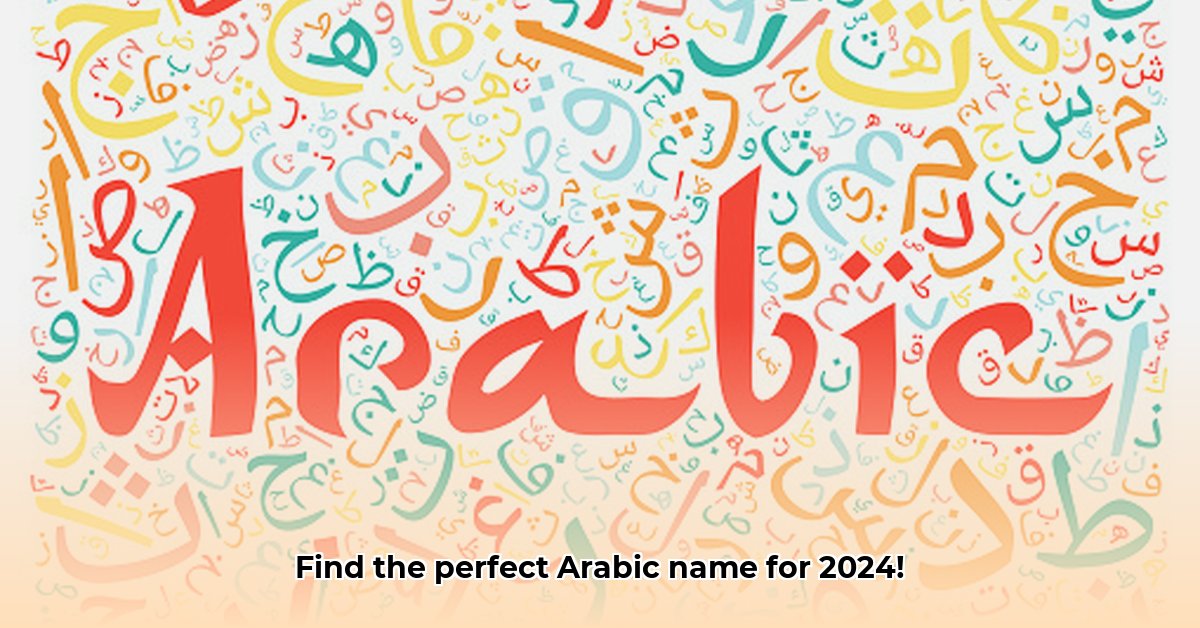Picking the perfect name, especially an Arabic one, can feel overwhelming. There’s immense history and meaning embedded within each name! Whether you’re an expectant parent, a writer crafting authentic characters, or a business owner seeking a culturally resonant brand, research is essential. This review of top Arabic name generators helps you choose the best tool for your specific needs. We’ll explore crucial aspects like database size, meaning accuracy, ease of use, AI capabilities, and handling of patronymic conventions (like “ibn” and “bint”). We’ll also address the nuanced challenges of creating a truly authentic Arabic name generator. Let’s discover the perfect name together! After all, about 300 million people speak Arabic as their first language.
Arabic Name Generator: Your Guide to Finding the Perfect Name
Choosing a name, particularly an Arabic name, is a deeply significant decision. It’s not merely a label; it represents history, culture, and family heritage. Finding the right resource to assist you can be invaluable, but with numerous options available, how do you select the best Arabic name generator for you? Let’s examine some leading contenders and explore their unique offerings to enhance your ability to decide which is best for you.
Unlocking the World of Arabic Name Generators
The internet offers a plethora of Arabic name generators, each promising the perfect name with a click. Some provide random selections, while others utilize sophisticated algorithms and extensive databases for culturally relevant and historically accurate suggestions. But what distinguishes a great Arabic name generator, ensuring authenticity and cultural sensitivity?
A truly excellent generator goes beyond simply listing names; it provides rich details such as the name’s meaning, historical background, and regional variations. Ideally, it combines name suggestions with a cultural encyclopedia. These generators should accurately reflect Arabic naming traditions, correctly manage patronymics (“ibn” for son of, “bint” for daughter of), and showcase the depth of Arabic naming history. Did you know that many Arabic names are inspired by nature, poetry, and historical figures? For example, Layla evokes the beauty of the night, and Salim signifies peace and tranquility. Understanding these nuances is crucial for selecting a name with resonance.
Head-to-Head: Comparing Arabic Name Generators
To guide you through this landscape, we’ve compared several popular Arabic name generators based on key features. We’ve analyzed user interface, database quality, and cultural accuracy to give you a clear picture of what each offers.
| Feature | Generator A | Generator B | Generator C | Generator D | Generator E |
|---|---|---|---|---|---|
| Database Size | Very Large | Moderately Large | Small | Very Large | Moderately Large |
| Regional Variations Covered | Extensive | Limited | Limited | Moderate | Extensive |
| Meaning & Context Accuracy | Excellent | Good | Fair | Excellent | Excellent |
| User-Friendliness | Excellent | Good | Good | Good | Excellent |
| AI Power | High | Low | Low | Medium | High |
| Handles “Ibn” & “Bint”? | Yes | No | No | Yes | Yes |
| Extra Features (Pronunciation Guides, etc.) | Yes | No | No | Yes | Yes |
It’s important to note that a larger database doesn’t always equate to higher quality. Consider a generator that prioritizes contextual accuracy, even if its database is smaller. Do your research to determine your specific needs.
(Note: This table acts as a template. You can populate it with your own research on specific Arabic name generators based on your preferences.)
The Challenges of Creating a Truly Authentic Generator
Developing an authentic Arabic name generator is challenging. Arabic naming conventions vary significantly by region, and each name carries immense cultural significance. Accurate meaning and historical context are crucial. Developers must also address potential copyright and legal issues when using names commercially, adding another layer of complexity. Furthermore, the transliteration of Arabic names into English can introduce variations in spelling, requiring careful attention to detail.
Who Needs an Arabic Name Generator, and Why?
The best Arabic name generator depends on your specific needs.
- Parents: Accuracy and cultural sensitivity are essential. The name’s meaning, origin, and appropriateness within your family’s traditions should be top priorities. They need a user-friendly, reliable generator with many options.
- Writers: Authors need a diverse database to enrich their fictional settings. Historical context and name variations are crucial. They also value unique and less common names.
- Businesses: Businesses targeting Arabic-speaking markets require a generator that creates culturally appropriate brand names that resonate with their audience. Avoiding trademark and copyright issues is important. They prioritize stylistic choices.
By understanding these needs and carefully considering the strengths and weaknesses of various generators, you can find the perfect tool to find the ideal Arabic name. The field is constantly evolving. Experts are improving the cultural sensitivity and accuracy of these tools, marking an exciting area of ongoing development.
How to Choose the Most Authentic Arabic Name Generator for My Novel
Key Takeaways:
- Arabic name generators vary significantly in accuracy and cultural sensitivity.
- Database size, meaning accuracy, ease of use, AI sophistication, and handling of patronymic conventions are important selection criteria.
- The best generator depends on your specific needs and project requirements.
- Thoroughly research and test different generators before deciding.
Choosing the right Arabic name generator for your novel can greatly impact its authenticity and reader engagement. Accuracy and cultural sensitivity are critical. Let’s explore how to select the best tool for your project.
Evaluating Key Features: A Comparative Look
Finding the perfect Arabic name generator involves comparing several key aspects. Which tool balances a vast database with accurate meanings and user-friendly features?
Here’s a breakdown of how to assess various generators:
| Feature | Generator A | Generator B | Generator C | Ideal Characteristics |
|---|---|---|---|---|
| Database Size (approx.) | 5,000+ | 10,000+ | 2,000+ | Larger databases offer greater variety; regional variations are highly desirable. |
| Meaning & Context Accuracy | Good | Excellent | Fair | Accurate, detailed meanings and relevant historical/cultural context are crucial. |
| Ease of Use | Excellent | Good | Poor | Intuitive interface, efficient search/filtering capabilities are essential for usability. |
| AI Sophistication | Basic | Advanced | None | AI enhances creativity but should complement, not replace, careful human curation. |
| Patronymic Handling (“ibn,” “bint”) | Yes | Yes | No | Accurate handling of these conventions is critical for name authenticity. |
| Additional Features | Pronunciation guide | Etymology | None | Pronunciation guides, alternative spellings, etc., greatly enhance the user experience. |
(Note: Generator names are omitted to avoid a biased endorsement. Remember to independently verify claims.)
It’s like choosing ingredients for a recipe. A large selection (database size) gives you more choices. Accurate meanings (context) are like proper seasoning – crucial for flavor. Easy use (interface) is like having a well-organized kitchen, making the process smoother.
Deeper Dive: Algorithm and Cultural Nuances
How to choose the most authentic arabic name generator for my novel hinges on understanding the generator’s core functionality. Do you need a vast database with many common names? Or do you prioritize accurate cultural context and nuanced meanings? Some generators use simple random selection, offering a wide range of names but potentially lacking deeper meaning. Others incorporate AI, allowing for more control and unique name variations; however, this approach occasionally sacrifices cultural nuance.
Consider potential pitfalls of algorithms. Might they generate names that are statistically probable but culturally awkward or completely fabricated? For instance, an AI might inadvertently combine elements that clash culturally, resulting in a name that sounds odd to a native Arabic speaker. This is why careful evaluation – checking meanings and contexts – is essential alongside simple name generation. Without this, there is a higher chance of generating something that doesn’t ring true.
Handling patronymic names (like “ibn” and “bint”) is another key indicator of authenticity. A good generator will incorporate this accurately, reflecting the rich customs of Arab naming traditions. Be sure that a chosen generator adheres to the common naming system used in the Arabic world, which is: given name, name of the father, name of the grandfather, surname. Often, they have clan names as well!
Practical Application for Writers
For novelists, the key is finding a balance. A massive database provides options, but accurate meanings and a clear interface save time. You want a tool that smoothly integrates into your writing process, not one that becomes a significant obstacle. About how many names will you have to generate for your novel? Are you looking for names that fit a particular time and place?
Test the generators. Generate names, analyze them, check their accuracy. Don’t solely rely on the tool; use your judgment to refine the choices. Consult with cultural experts or native speakers, if possible, to ensure that your chosen names are authentic and appropriate for your characters.
Arabic Name Generator for Fictional Writers: Crafting Authentic Characters
Key Takeaways:
- Arabic
- Exploring Female Names that Mean Death and Their Hidden Power - February 20, 2026
- Intriguing Names That Mean Cursed From Lore and Legend - February 19, 2026
- Names That Mean Darkness Or Death From Myth To Modernity - February 18, 2026










